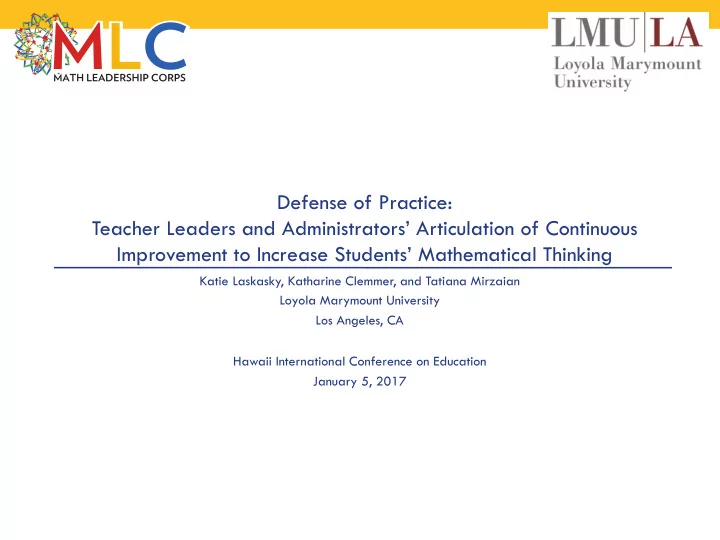

Defense of Practice: Teacher Leaders and Administrators’ Articulation of Continuous Improvement to Increase Students’ Mathematical Thinking Katie Laskasky, Katharine Clemmer, and Tatiana Mirzaian Loyola Marymount University Los Angeles, CA Hawaii International Conference on Education January 5, 2017
Math Leadership Corps (MLC) Vision: We envision a future where all students have the mathematical reasoning and procedural skills to design creative solutions to complex problems.
An Intersectoral Partnership 14,363 students in 23 schools
Math Education Problem: Students are underperforming in mathematics 2011 Trends in International Mathematics and Science Study (TIMMS) U.S. 11 out of 57 countries in fourth grade math U.S. 9 out of 56 countries in eighth grade math 2011 Programme for International Student Assessment (PISA) by Organization for Economic Co-operation and Development (OECD) U.S. 27 out of 34 countries (15 year olds) U.S. Ranked Below OECD average in mathematics
Different Approaches to a Complex Problem • More money to fund programs, • Hire the best personnel, and • Laws and policies to hold educators accountable for reaching the goal of improving math education for all students Fowler, 2009
External Accountability 2002: No Child Left Behind (NCLB) 2009: Race to the Top grants 2015: Every Student Succeeds Act (ESSA)
Internal accountability Individual’s sense of responsibility; 1. Parents’, teachers’, administrators’, and students’ collective 2. sense of expectations; Organizational rules, incentives, and implementation 3. mechanisms that constitute the formal accountability system in schools Carnoy, Elmore, & Sisken, 2003, p. 4 MLC is taking a public learning stance. Knapp & Feldman, 2012
Our study Purpose : Describe how K-12 math instructional leaders, including district and site administrators and teacher leaders, engage in problem solving, using an internal accountability process called the “Defense of Practice” Research Question : How do math instructional leaders solve complex math education problems related to student learning?
Definition of Defense of Practice A process for leaders’ to articulate specific decisions about student learning and the reasons why they make them
Structure for Defense of Practice • State a goal that elicits teacher and/or student actions during rigorous mathematics and aligns to the school math focus, • Provide rationale for actions and evidence of student engagement and achievement over time, • Articulate next steps based on data, and • Provide a self-reflection on the process of continuous improvement and how feedback has supported students and teacher learning • Ten minutes to defend • Defend each semester
Sample Elementary Secondary District Site District Teacher Teacher Administrators Administrators Leaders Leaders District A 1 4 1 4 District B 1 3 2 2 District A 3,876 students, • 4 schools, • 85% underrepresented minorities, • 45.1% qualify for free and reduced lunch, and • 8.7% English Language Learners • District B 3,415 students, • 3 schools, • 45.7% underrepresented minorities, • 11.5% qualify for free and reduced lunch, and • 5.7% English Language Learners •
Data Generation and Analysis • PowerPoint presentation slides – May 2016 • Codes aligned with problem solving and self-regulation from social cognitive theory Zimmerman & Campillo, 2003
Finding 1: Data use when goal setting and evaluating Administrator Variety of Data: Instruction, Coaching, and Administrator Teacher Leader - Coaching
Finding 2: Planning for action Teacher Leader - Instruction Teacher Leader - Coaching Administrator
Finding 3: Motivation to defend and improve practice Site Administrators Teacher Leader - Coaching
Implications: Data-driven decisions • Further questions: • What were the solution options? • Why did the chosen solution work? • Importance of collecting, analyzing, and using data for a purpose • Data, specific to math education, should be collected throughout performance and over time to evaluate the solution (Cleary, Callan, & Zimmerman, 2012).
Implications: Internal accountability • Relies on collective effort, transparent plans and data, and dialogue about successes and challenges • Further questions: • What were the metrics for evaluation? • What was the importance of these collaborations? • How did interactions between participants lead to improved solutions? • Without these connections, solutions and individuals appear isolated instead of part of a systematic solution for math education created by a collaborative problem solving team.
Conclusion: Defense of Practice Definition: A process for leaders’ to articulate specific decisions about student learning and the reasons why they make them Partner teachers co-present on: Teachers and their site admin co- Site and district administrators present on: co-present on: • How the district professional • Their instructional system, their peer • How they are developing leadership coaching collaboration, and their vision learning system supports all math for their students’ success. capacity within their departments to teachers in data-driven instruction, • Student-focused goals and student implement data-driven instruction, observation and feedback, achievement and learning data that observation and feedback, and planning, and professional shows progress over time towards planning. development. • Data that shows that everyone • Data that shows progress in achieving success. teaching mathematics is improving developing a student and staff their craft. culture that ensures a positive, strong community. Through this process, math instructional leaders develop their self- regulation skills (Zimmerman & Campillo, 2003) .
Recommend
More recommend